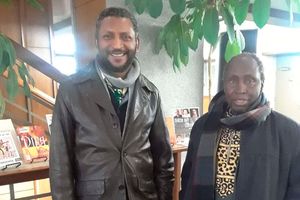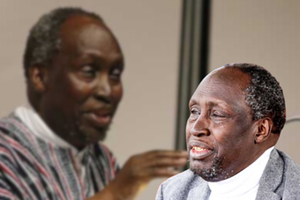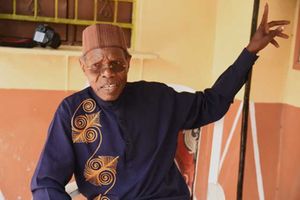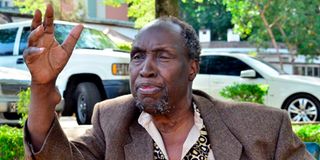
Renowned Author Ngugi wa Thiong'o.
For an author who drew the attention of Kenyans since the early 1960s, Ngugi wa Thiong’o was up there in the list of the country’s newsmakers. Scouring through the archives, we got some of the headlines he made, which captured the key moments of his life.
Kenya author wins top literary prize – June 29, 1973
By the time this story was published, Ngugi wa Thiong’o had released numerous works, among them, The Black Hermit (1963), Weep Not, Child (1964), The River Between (1965), A Grain of Wheat (1967), This Time Tomorrow (1972) and Homecoming (1972). The story was about Prof Ngugi winning the Lotus Prize for Literature, recorded as the second major award he ever got in his decorated career.
“Africa’s well-known writer who is also head of the Literature Department of the Nairobi University, has been awarded the highly coveted Lotus Prize for Literature for 1973,” said the report. “The honour, which is awarded yearly by the Permanent Bureau of Afro-Asian Writers, has been made in appreciation of his literary works which are in conformity with the objectives of the Afro-Asian writers’ movement.”
Students give freed Ngugi wild reception – December 14, 1978
This story captures the life that Ngugi led while in Kenya, where being thrown into prison was the order of the day. The story reported his address to University of Nairobi (UoN) students at the Taifa Hall a day after his release just months after President Daniel Moi had succeeded Jomo Kenyatta.
“The students who were gathered to launch the new Nairobi University Students Organisation, broke into uproar when Prof Ngugi was carried shoulder-high into the hall,” the report said. “When asked to talk about detention, the professor said: ‘I have been away for a long time and I need time to collect my thoughts together. We shall talk at greater length later.’”
Ngugi raid: Three fined for attack on home – December 16, 1978
Before his December 1978 release from prison, Ngugi’s house was raided. His wife was attacked. Just after his release, three men were fined Sh1,000 each for the attack, or in default serve six months in jail.
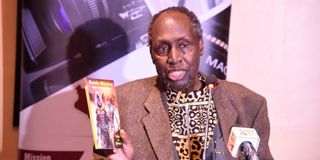
Literature scholar and author Ngugi wa Thiong’o.
Kiambu magistrate Emmanuel O’Kubasu summed up: “I don’t wish to speculate on the motive behind this attack on a defenceless woman (Ngugi’s wife). Suffice to say it was unlawful,” the Nation reported.
Ngugi ‘was threatened’ – April 7, 1979
Ngugi was in trouble with the authorities after he and his UoN colleague were charged with drinking after hours and behaving in a disorderly manner. The acclaimed author said he had received death threats over the phone.
Ngugi cleared of drinks charge – April 28, 1979
Kiambu Senior Resident Magistrate Emmanuel O’Kubasu dropped the drinking after hours charges. Ngugi’s lawyer was Willy Mutunga, who later became Kenya’s Chief Justice.
Allow Ngugi back — appeal – July 17, 1979
After detention, Ngugi was not immediately allowed into the teaching halls of the UoN. The university’s academic made an appeal to President Daniel Moi, who was then the chancellor.
The Nation reported: “The academic staff said in the petition to the President: ‘We strongly feel that Prof Ngugi can only participate fully in nation-building by taking his place in the university.’”
Kamirithu: Drama behind the drama’– January 22, 1982
Ngugi sparked a unique kind of flame in his birthplace of Kamirithu by organising the staging of a play by the Kamirithu Educational and Cultural Centre.
“But when the group was riding the crest of fame with audiences packing the open-air theatre constructed by the Kamirithu people in their village, the local DC withdrew the licence that had allowed them to perform. Soon afterwards, Ngugi wa Thiong’o was detained and that seemed like the end of Kamirithu activities,” the Nation reported.
Njonjo criticises Ngugi wa Thiong’o – February 16, 1982
The Moi government remained uneasy with Ngugi’s works.
“The Minister for Constitutional and Home Affairs, Mr Charles Njonjo, yesterday criticised Kenyan author Ngugi wa Thiong’o. He described his work as ‘misleading’ and not educating the people of Kenya. Mr Njonjo said: “Books written by the author such as ‘Caitaani Mutharabaini’ (Devil on the Cross) mislead the reader because one was not told what the author was writing about,’” the Nation reported.
Ngugi’s play in licence obstacle – February 17, 1982
In early 1982, Ngugi wrote a play titled Maitu Njugira but struggled to get a licence.
“Producers of Ngugi wa Thiong’o’s play ‘Maitu Njugira’ are making feverish attempts to get a licence for staging the play. The opening is scheduled for Friday at the Kenya National Theatre, Nairobi, and all four shows are said to be fully booked,” the Nation reported.
Later in 1982, Ngugi fled to exile “after he said he learned of plans by President Moi’s security services to arrest and kill him” as reported by Reuters.
Nyambura: It has been tough without him, but life must go on’– March 13, 1994
More than a decade after Ngugi went into political exile, his wife, Nyambura, had an interview with Nation, by then, it had been reported that Ngugi had married another woman—Njeeri.
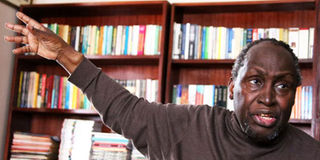
Ngugi wa Thiong’o, one of Africa’s foremost authors.
“Asked about her feelings about the marriage, the soft-spoken Nyambura quipped: ‘It was the tradition of the Agikuyu men to marry another woman later in life to help the first wife with domestic chores,” the Nation reported.
Ngugi’s life in self-exile – January 18, 1995
A Nation reporter had an interview with Ngugi while he was a professor of comparative literature and performance studies at New York University.
“He explains that the reason why his books have become famous is because they have described events that eventually happened or were corroborated by real experiences,” the paper wrote.
“Ngugi’s emotional return” – August 8, 2004
Alongside the photo of Ngugi and his wife, Njeeri, kissing the ground at his home village of Kamirrithu, the Nation reported: “Renowned author Ngugi wa Thiong’o yesterday made an emotional return to his home in Kamirithu village in Kiambu, kissed the soil and immediately proceeded to his wife’s grave where he laid a wreath. Ngugi, who returned to the country last Saturday after a 22-year absence in self-exile, asked family members to show him Nyambura’s grave. He was accompanied by his second wife, Njeeri.”
‘Ngugi: My wife’s sex ordeal in gang raid’ – August 16, 2004
The author’s return to Kenya hit turbulence.
“A four-man gang forced their way into the Ngugis’ flat at Norfolk Towers in the city centre on Thursday and beat up Prof Ngugi, torturing him with burning cigarettes and whipping him with the butt of a pistol. It happened barely a fortnight after they had jetted into the country to red-carpet reception. Yesterday, he revealed that the gang also raped Njeeri as he and a colleague who also in the flat struggled with the thugs,” reported the Nation.
‘Revealed: Luxury life of Ngugi raid suspect’ – January 12, 2006
“A key suspect in the Ngugi wa Thiong’o robbery case has been enjoying a life of luxury at the country’s top city hospital while his co-accused languish in harsh remand prison conditions. Mr Chege Kiragu was transferred from the Kamiti Maximum Prison to Nairobi Hospital last year, suffering from an undisclosed ailment,” the Nation reported.
Mr Kiragu, who was a relative of the Ngugis, was later acquitted.
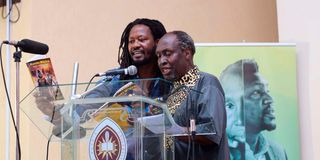
Prof Ngugi wa Thiong’o and poet and human rights activist Ndungi Githuku at St Paul’s University in Limuru, Kiambu County on February 21, 2019.
‘Guards to die for attack on the Ngugis’ – December 16, 2006
The trial that followed the attack on the Ngugis went on for two years and towards the end of 2006, three men were sent to the gallows.
“Three security guards who violently attacked and robbed novelist Ngugi wa Thiong’o and his wife, Njeeri, have been sentenced to death,” the Nation reported. They were Richard Kayago Maeta, Elias Sikuku Wanjala and Peter Mulati Wafula.
“The three men were convicted of the same robbery, while Mulati was found guilty of a separate charge of raping Mrs Ngugi. He is to serve 21 years in prison, in addition to the death sentence for the rape,” the paper added.
‘Ngugi at 70: Reminisces of an African icon’ – August 31, 2008
In the year he turned 70, Ngugi had an interview with Nation where he looked back at his life in the arts.
“The most exciting time was the sixties of the last century,” he said. “I was a student of English at Makerere. All around was the energy generated by the forces of anti-colonialism. There was a sense that a new world was about to be. The organised actions of ordinary man and woman were making that vision seem possible. This energy and optimism were what made me a writer.”
‘Why Mukoma wa Ngugi says he won’t love his father less’ – March 23, 2024
After Ngugi’s son, Mukoma, posted online that his father was known to batter his first wife, Nyambura, the literary world was shocked.
Academic John Ndavula contacted Mr Mukoma to address the allegations, and he denied claims that he was seeking publicity.
“I am at a point in my life where I value truth. I worry that we live in a celebrity culture – we are all flawed human beings full of contradictions,” said Mr Mukoma.

